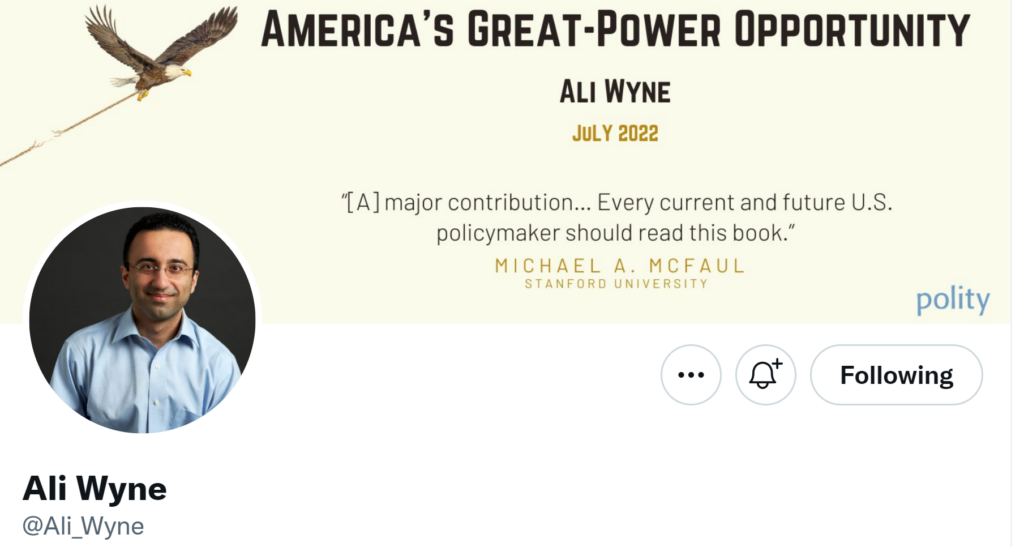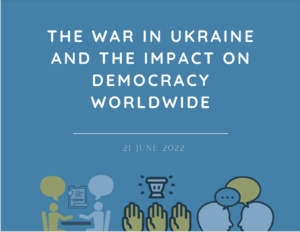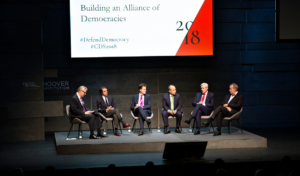 The strategic consequences of the war in Ukraine are more complex and ambiguous than a polarized conflict pitting democracy against autocracy, argues Ali Wyne, a senior analyst at Eurasia Group and author of the new book, America’s Great-Power Opportunity: Revitalizing U.S. Foreign Policy to Meet the Challenges of Strategic Competition.
The strategic consequences of the war in Ukraine are more complex and ambiguous than a polarized conflict pitting democracy against autocracy, argues Ali Wyne, a senior analyst at Eurasia Group and author of the new book, America’s Great-Power Opportunity: Revitalizing U.S. Foreign Policy to Meet the Challenges of Strategic Competition.
Geopolitics is about to get a lot messier because “the degree of unity among advanced industrial democracies is not as great or as enduring as some commentary might suggest,” but the same observation also applies to the strength of the Sino-Russian entente, he tells The Hub’s Rudyard Griffiths.
 “There’s no question… that some of the alignments or the realignments that we are seeing are the product of the shock resulting from Russia’s invasion,” adds Wyne, a term member of the Council on Foreign Relations and a former Penn Kemble fellow at the National Endowment for Democracy (NED). “But I think that the unity or the coalescence or alignment that is born of reactive shock doesn’t necessarily translate into perpetuity into the kind of unity that’s born of shared affirmative purposes.”
“There’s no question… that some of the alignments or the realignments that we are seeing are the product of the shock resulting from Russia’s invasion,” adds Wyne, a term member of the Council on Foreign Relations and a former Penn Kemble fellow at the National Endowment for Democracy (NED). “But I think that the unity or the coalescence or alignment that is born of reactive shock doesn’t necessarily translate into perpetuity into the kind of unity that’s born of shared affirmative purposes.”
His book draws on dozens of interviews with government officials to assess the utility of “great-power competition” as a framework for shaping U.S. foreign policy, he told CSIS (below), concluding that strategy should not be driven by or beholden to the actions of a resurgent China and a revanchist Russia.
The advanced industrial democracies have “mobilized an unprecedented response to Russian aggression, particularly on the economic side in imposing very swift sanctions … but even within that bloc, you’re seeing incipient signs of duress,” he observes. Such tensions have raised questions as to whether democracies have sufficient stamina to sustain collective commitment to Ukraine.
Even within Western democracie s, it’s not clear that the extraordinary galvanized response to Russian aggression can be sustained, particularly as the war’s externalities – such as disruptions to global energy and food markets – grow more pronounced, Wyne contends. Furthermore, “Europe by sheer dint of geography, doesn’t have the choice [and] has to focus more on Russia than it does on China, while the U.S. wants to focus on China and “accord singular strategic priority to the Indo-Pacific,” factors which generate “a certain misalignment of strategic priorities.”
s, it’s not clear that the extraordinary galvanized response to Russian aggression can be sustained, particularly as the war’s externalities – such as disruptions to global energy and food markets – grow more pronounced, Wyne contends. Furthermore, “Europe by sheer dint of geography, doesn’t have the choice [and] has to focus more on Russia than it does on China, while the U.S. wants to focus on China and “accord singular strategic priority to the Indo-Pacific,” factors which generate “a certain misalignment of strategic priorities.”
The conflict offers battlefield lessons for the arsenals of democracy, argues James Hasik, a Non-resident Senior Fellow with the Transatlantic Defense and Security program at the Center for European Policy Analysis (CEPA). NATO can easily win the race for better weapons faster, if government officials act with decision, he contends:
Russia’s weapons industry is headed for an “all-out crisis,” if it cannot steal enough sanctioned technology from abroad. Forget its military export markets: its global reputation will not recover for a very long time. The alliance and its partners have defense industries that will continue to dominate markets around the world. Unleash their potential, and they will supply anything needed to win this and future wars.
 A successful reconstruction of Ukraine is imperative to upholding values of freedom and democracy and vital to global security, says the Center for Strategic and International Studies (CSIS), announcing the launch of a bipartisan and international Ukraine Economic Reconstruction Commission.
A successful reconstruction of Ukraine is imperative to upholding values of freedom and democracy and vital to global security, says the Center for Strategic and International Studies (CSIS), announcing the launch of a bipartisan and international Ukraine Economic Reconstruction Commission.
“It is essential that Ukraine not only defeat Russia’s aggression but promptly rebuild its economy. This timely CSIS commission will work on helping Ukraine’s crucial postwar recovery,” said Ambassador Paula Dobriansky, former under secretary of state for democracy and global affairs, and one of the commission’s three co-chairs.







